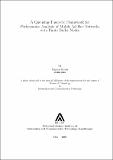Queueing-theoretic framework for perfermance analysis of mobile ad hoc networks with finite buffer nodes
Abstract
Wireless Ad Hoc network is a decentralized wireless network which allows nodes to join and create networks without any infrastructure. These kinds of networks are advantageous because they can be readily deployed anywhere, anytime. Mobile Ad Hoc Network (MANET) is a special type of ad hoc network where nodes are mobile. Due to mobility of the nodes, network topology may change rapidly and unpredictably.
MANETs are expected to plat a vital role in a variety of applications and are therefore studied extensively. It is imperative to analyze these networks, to assess the suitability of their use in different scenarios and to identify the techniques to improve their performance. In last few years, many models have been proposed to analyze MANETs. Many of then have an unrealistic assumption of an infinite buffer in each node. Moreover, in MANETs, as nodes are mobile, a packet may revisit the same node which creates feedback loops of a packet. These loops make modeling and analysis of MANETs difficult as the network becomes cyclic.
This work analyzes MANET with finite buffer nodes. Open finite queuing network with gated queue, intermittent links and servers is used. The expansion method technique has been used to study the open finite queuing network with stable links and servers. We modify the method for intermittency. Numerical results are derived and compared with simulation results to show effectiveness of the method.
Collections
- M Tech Dissertations [923]
Related items
Showing items related by title, author, creator and subject.
-
Comparative study between exponential back off and dynamic waiting strategies for medium access in wireless ad hoc networks
Shah, Rahul (Dhirubhai Ambani Institute of Information and Communication Technology, 2009)IEEE 802.11 DCF (IEEE 802.11 Distributed Coordination Function) is widely used MAC protocol for wireless channel access. Although it is developed for single hop networks where all nodes are in the same radio range, it can ... -
Cooperation enforcement mechanisms in wireless adhoc networks
Chaturvedi, Manish Shivshankar (Dhirubhai Ambani Institute of Information and Communication Technology, 2009)Wireless adhoc networks are autonomous, infrastrutureless networks where there are no dedicated routers or base stations and nodes are expected to cooperate in Wireless performing routing duties to keep network connected. ... -
Wireless sensor network based automatic meter reading: WSNAMR
Sutariya, Mahesh R. (Dhirubhai Ambani Institute of Information and Communication Technology, 2009)Automatic Meter Reading is technology evolved from 1995[3] or before, for remote collection of utilities measurement data which involve Electricity, Gas and Water etc. In this process of evolution every time new idea was ...

